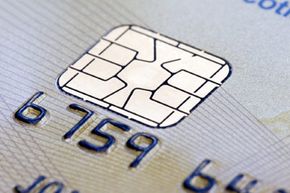A smart card resembles a credit card in size and shape, but inside it is completely different. First of all, it has an inside -- a normal credit card is a simple piece of plastic. The inside of a smart card usually contains an embedded microprocessor. The microprocessor is under a gold contact pad on one side of the card. Think of the microprocessor as replacing the usual magnetic stripe on a credit card or debit card.
Smart cards are much more popular in Europe than in the United States. In Europe, the health insurance and banking industries use smart cards extensively. Every German citizen has a smart card for health insurance. Even though smart cards have been around in their modern form for at least a decade, they are just starting to take off in the United States.
Advertisement
Magnetic stripe technology remains in wide use in the United States. However, the data on the stripe can easily be read, written, deleted or changed with off-the-shelf equipment. Therefore, the stripe is really not the best place to store sensitive information. To protect the consumer, businesses in the U.S. have invested in extensive online mainframe-based computer networks for verification and processing. In Europe, such an infrastructure did not develop -- instead, the card carries the intelligence.
The microprocessor on the smart card is there for security. The host computer and card reader actually "talk" to the microprocessor. The microprocessor enforces access to the data on the card. If the host computer read and wrote the smart card's random access memory (RAM), it would be no different than a diskette.
Smarts cards may have up to 8 kilobytes of RAM, 346 kilobytes of ROM, 256 kilobytes of programmable ROM, and a 16-bit microprocessor. The smart card uses a serial interface and receives its power from external sources like a card reader. The processor uses a limited instruction set for applications such as cryptography.
The most common smart card applications are:
- Credit cards
- Electronic cash
- Computer security systems
- Wireless communication
- Loyalty systems (like frequent flyer points)
- Banking
- Satellite TV
- Government identification
Smart cards can be used with a smart-card reader attachment to a personal computer to authenticate a user. Web browsers also can use smart card technology to supplement Secure Sockets Layer (SSL) for improved security of Internet transactions. Visa's Smart Card FAQ shows how online purchases work using a smart card and a PC equipped with a smart-card reader. Smart-card readers can also be found in mobile phones and vending machines.
See the next page for more information.
Advertisement
